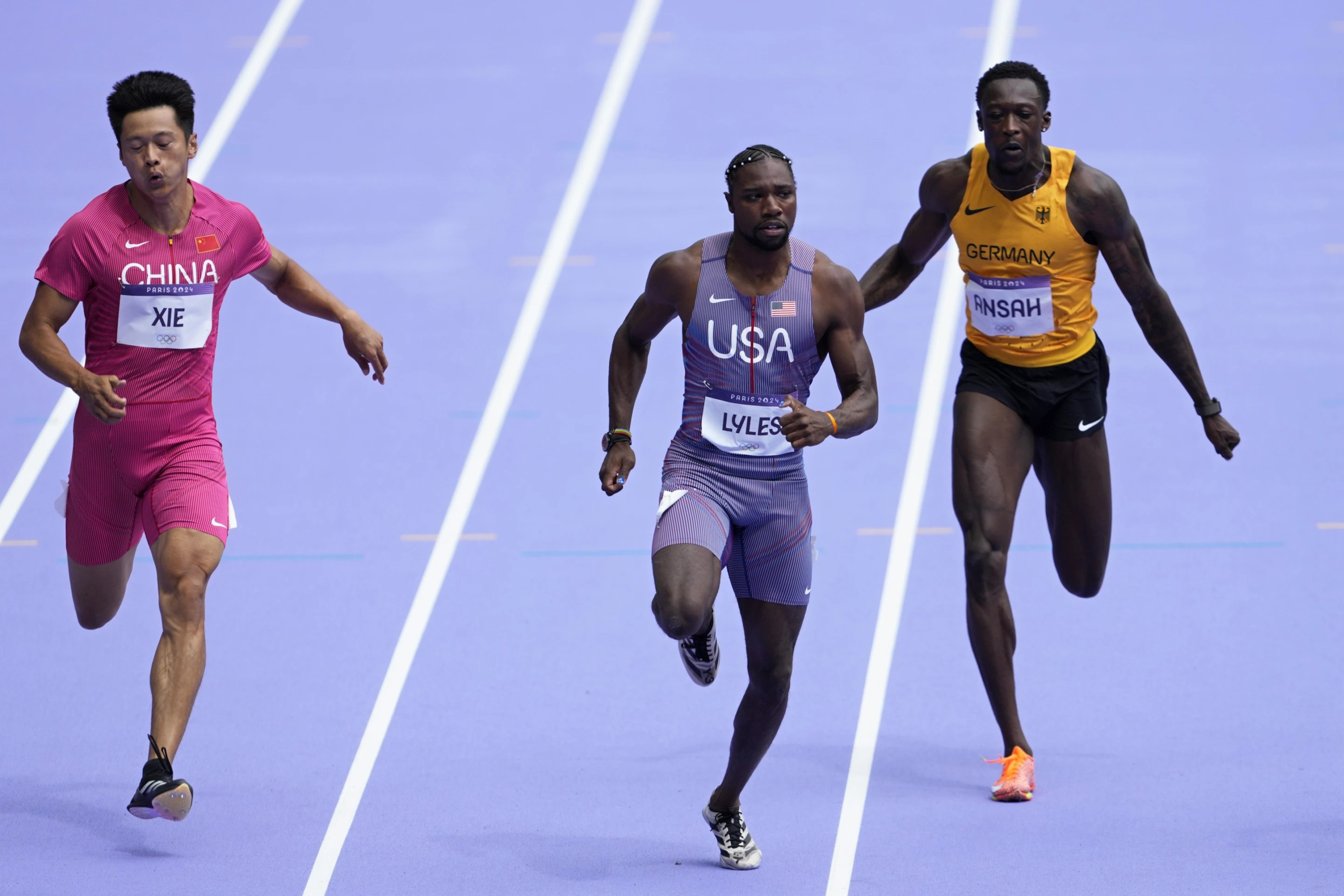Sports
A second-place finish means Lyles won’t have the premier lane choice when he races in the semifinals Sunday
SAINT-DENIS, France (AP) — Noah Lyles walks around the Olympic Village in disguise, wearing sunglasses, a hat and even a mask to cut down on some of the attention he receives.
On the track, he can’t avoid it. Or everyone’s best shot.
It’s a lesson he learned when finishing second in his opening heat of the 100 meters Saturday at the Paris Games. The American got off to a sluggish start and finished in 10.04 seconds, which was .06 behind Louie Hinchliffe, a British sprinter being trained by Carl Lewis.
Going against Lyles is always a big deal.
“These boys said they were coming to play,” he said. “That’s my first lesson in underestimating the power of the Olympics. When somebody’s on the line, they’re going to give it their all or nothing.
“But now I don’t have to hold back. I’m ready to go.”
Lyles was clowning around before settling into the starting blocks. He preened for the camera, flashed his Team USA-themed nail polish — the color blue with stars — and threw some imaginary jabs like a prizefighter. He fed off the noise from the packed stadium. Once the race started, he needed to tap into an extra gear to climb back into second.
“To be honest, I was kind of playing my cards close to the chest,” Lyles explained.
The second-place finish means Lyles, the reigning world champion at 100 and 200 meters, won’t have the premier lane choice when he races in the semifinals Sunday. If he advances from that, he’ll race for the gold medal later in the evening.
“I downplayed my competitors for sure,” Lyles said. “I was like, ‘There’s no reason to really put any emphasis on it.’ But these guys proved to me that they’re ready to compete. I said, ‘All right, I can’t do that anymore.’ I promise that will not happen again.”
Also advancing in the early heats were Kishane Thompson of Jamaica, who slowed over last 20 meters and still won his heat in 10 seconds flat. Thompson’s heat was delayed several minutes after British sprinter Jeremiah Azu was called for a false start. Azu looked at the replay and pleaded his case with the officials before leaving the track.
Ferdinand Omanyala of Kenya won his heat in 10.08 and Oblique Seville of Jamaica won his in 9.99. Reigning Olympic champion Marcell Jacobs, who said he was bitten by an insect while in the starting blocks, finished second in his heat to advance.
“I made a few mistakes at the start,” Jacobs said, “which didn’t allow me to get the pace that I wanted.”
Lyles’ U.S. teammates, Fred Kerley and Kenny Bednarek, won their heats in strong fashion, too, both going 9.97.
“This year, I’m changing the narrative. I’ve been the underdog for a couple of years,” said Bednarek, a silver medalist in the 200 meters at the Tokyo Olympics. “I’m not trying to be the underdog, I’m trying to be the top dog. Once I finally hit that milestone, I’m not coming back. I’m going to run away with it.”
For Lyles, this was just business. After his race, he even approached Hinchliffe with words of encouragement.
“Just, ‘Well done,’” Hinchliffe said of their conversation. “Just acknowledging me.”
Lyles said the pressure of the world championships last summer was more than he’s felt so far at these Olympics.
“I felt like I had to fight to prove that I was the fastest,” said Lyles, one of the stars of a Netflix documentary on sprinters. “This time, a lot of people know it and I already have the target on my back.”
He’s not sure what kind of time it’s going to take to claim Olympic gold but he is confident of this: “I’m going to run it,” Lyles said.
Abbey Caldwell of Australia was one of the women’s 800-meter runners who took advantage of the safety net that is the repechage round to move on to the semifinals. This is the first Olympics where track has used the repechage rule, which gives a second chance to hurdlers and to sprinters and middle-distance runners who don’t move on from their opening heats in the 200 through 1,500 meters.
Associated Press
April Ryan
Associated Press
Associated Press
Associated Press
Associated Press
Associated Press
Associated Press
Caldwell grabbed one of the six spots available.
“I’m very fortunate and super happy,” Caldwell said.
It was an easy day of qualifying for defending Olympic pole vault champion Mondo Duplantis. The Swedish world-record holder took just two jumps and cleared both heights.
“A boring qualifying in a way, which I wanted,” Duplantis said. “As uneventful as I wanted.”
American Sam Kendricks made it through but his teammate Christopher Nilsen, the Olympic silver medalist in Tokyo, didn’t advance.
Comoros sprinter Hachim Maaroufou wears a hat turned backward when he races for one simple reason — it makes it easier for family and friends to spot him. … Shaun Gill, who represents Belize, is calling it a career so he can become an industrial engineer. “Time to gain that real-world experience of an engineer,” the 31-year-old graduate of Texas A&M University Kingsville said.
New: Lisa Price
Stream All Episodes OnDemand
Noah Lyles closes strong to advance in 1st round of the 100 in Paris as he pursues an Olympic double

